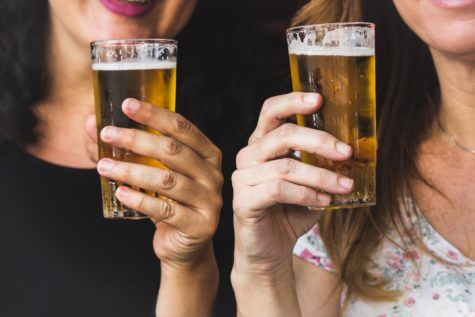LINCOLN, Neb. — Men have donned so-called “beer goggles” since the dawn of time it seems, but only now is science beginning to weigh in. A new study confirms that males objectify the fairer sex while intoxicated — although women who appear smart and kind may attract the gazes of fewer lustful eyes.
Researchers at the University of Nebraska-Lincoln recently recruited nearly 50 male twentysomethings to participate in a lab-based study on sexual attraction. Participants were assigned to one of two groups: one that consumed two servings of alcohol or one that drank a placebo cocktail. Afterwards, the men were asked to evaluate the attractiveness and personalities of 80 college-aged women based on a provided photograph.

Using eye-tracking technology, the researchers, unsurprisingly, found that women who had been previously rated as attractive by an independent panel attracted longer gazes. These prolonged gazes, which tended to coalesce around a female’s breasts and midsection, were observed among both groups.
Female subjects, however, could combat objectification by giving off the impression of being intelligent and compassionate. This diminishing effect was even stronger among guys who’d had a few too many drinks.
To recap: men aren’t predisposed to froth at the mouth over “5s,” or women who seem like decent human beings, no matter their sobriety.
“The sum of these results supports the notion that being perceived as high in humanizing attributes, such as warmth and competence, or being average in attractiveness provides a buffer that protects women from sexual objectification,” explains Abigail Riemer, the study’s lead author, in a statement.
Still, Reimer emphasizes that alcohol can encourage male behaviors that leave females feeling lesser. This “potentially lay[s] the foundation for many negative consequences such as sexual violence and workplace gender discrimination,” she warns.
Some men, Reimer adds, have formed the belief that women who lack conventional beauty are fair game to objectify, a notion she vehemently rejects. Objectification begets further objectification, no matter whom the initial act is directed toward.
“Understanding why the objectifying gaze occurs in the first place is an initial step toward stopping its incidence and its damaging effects,” Riemer concludes. “[Our research] may inform primary prevention programs to reduce the continuum of sexual violence that women disproportionately experience.”
The researchers published their findings Dec. 20, 2017 in the journal Sex Roles.
